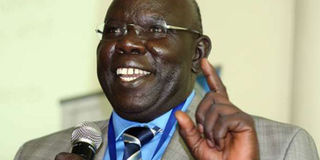Commission to overhaul higher education through appraisal

Commission for University Education CEO David Some addresses participants at a stakeholders' workshop at Panari Hotel on March 7, 2016. Auditing of universities will begin on January 23, 2017. FILE PHOTO | NATION MEDIA GROUP
What you need to know:
- Earlier this week, Prof Some said the commission would not be recalling degrees awarded to students who had enrolled with grades lower than C-Plus – the minimum entry requirement.
- The audit of the universities is seen as part of ongoing reforms in the education sector, which have affected all levels of learning.
Universities will undergo an audit to establish how they have been awarding degrees following questions over the quality of graduates.
The Commission for University Education (CUE) has said that its quality assurance officers will be visiting universities later this month to check on compliance with education standards as provided for in the institutions’ charters and relevant laws.
“All universities (public and private) are required to prepare and submit to the Commission for University Education a self-assessment report on all areas of compliance,” says a statement by the CUE Chief Executive Officer, Prof David Some.
The institutions are required to submit the reports between January 9 and 16.
It was however not clear what action the commission would take against universities found to have flouted the rules.
Earlier this week, Prof Some said the commission would not be recalling degrees awarded to students who had enrolled with grades lower than C-Plus – the minimum entry requirement.
He said it was up to universities’ senates to decide whether or not to recall the degrees awarded arbitrarily.
Senates are by law required to approve all degree awards.
The audit of the universities is seen as part of ongoing reforms in the education sector, which have affected all levels of learning.
Under the changes, there is a shift to enhancing the competence of students to solve problems with reduced emphasis on the grades they score in exams.
In a letter to Vice-Chancellors, dated December 19, 2016, Prof Some says that the commission’s quality assurance officers will conduct inspection tours of all the universities authorised to operate in Kenya.
Among other things, they will be checking whether the students enrolled in various programmes are suitably qualified.
The over 50 universities and their affiliates will also be required to show that they have ensured that students attend the recommended number of class hours.
The audit will cover the period between 2012 and 2016.
The team will also audit the integrity of examinations, delays in release of transcripts and missing marks.
The investigations will start on January 23 and end on February 10.
Universities will also be required to show how they have been awarding honorary degrees and whether they follow the Universities Standards and Guidelines, 2014.
The institutions will also be under scrutiny on appointments and promotion of academic staff and whether they comply with the harmonised minimum criteria for appointment and promotion of academic staff.
The letter says the inspection team will interview students, academic and non-teaching staff, alumni, management, Senate and Council members and the Boards of Trustees.





